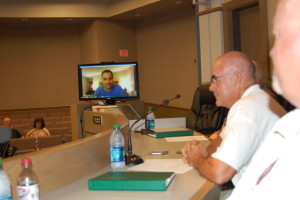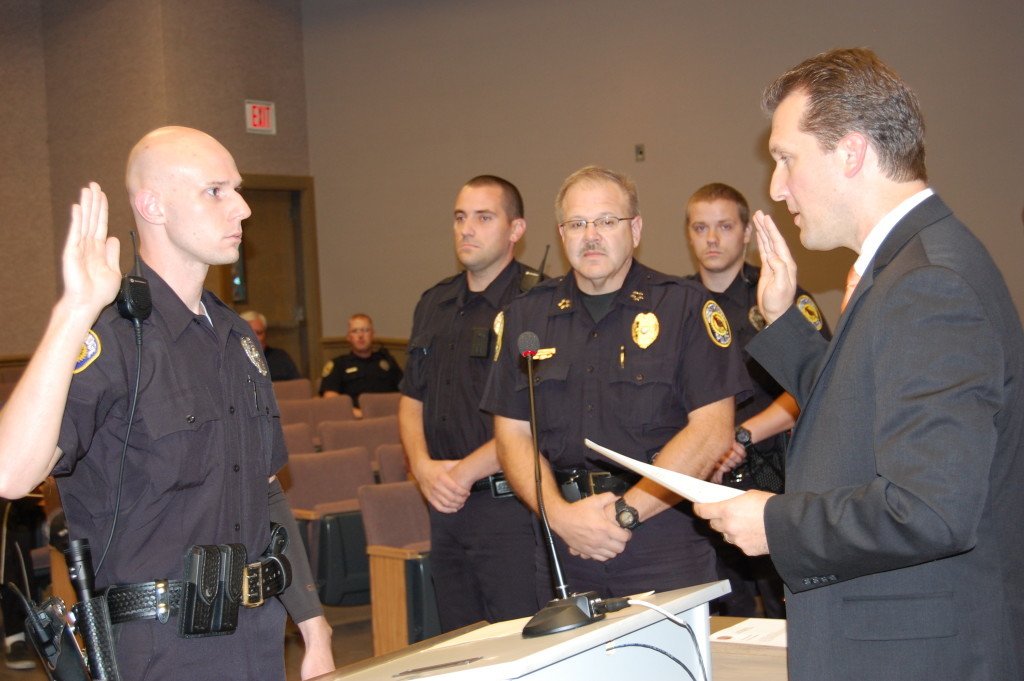The East Ridge City Council welcomed three new police officers to the city’s force Thursday night during its regular meeting at City Hall.
Mayor Brent Lambert administered the Oath of Honor to new officers Paul Carrano, John Perry and William Johnson, as Chief J.R. Reed looked on.
The Council also embraced the sale of beer at the new Walmart Neighborhood Market. In a unanimous vote, the board passed a variance for the city’s newest grocery store, which will open on Oct. 28, to sell beer.
Representatives from Hutton Co., the developers building the 41,000 square-foot facility in the 4100 block of Ringgold Road, explained to the council that a provision in the city’s beer ordinance was different from most laws that city’s have governing where beer can be sold.
Ben Berry, the project manager for the store, said that the new business complied to the city’s laws in terms of required distances from schools, churches and public gathering places. However, the city’s code also has a provision that won’t allow beer sales within 250 feet of a residence. The Walmart Neighborhood Market is adjacent to East Ridge Avenue, where several homes are within that defined space.
“This whole variance came about because we have an ordinance that says ‘or residential,'” Vice Mayor Mark Gravitt stated to Hutton Co. executive Jeff Soble. “That’s the gist.”
Gravitt asked Hutton Co. representatives about how much money was invested in the project and how many people the store would employ. The answer was “multi-millions” and more than 100 folks would be put to work.
“We’re trying to instill economic development, and this store will have an impact on jobs and sales taxes,” Gravitt said. “They haven’t asked for anything from the city, PILOT (payment in lieu of taxes) or other funding.”
Gravitt made a motion to allow beer sales and Councilman Larry Sewell seconded the motion.
Mayor Lambert suggested that the City take a hard look at amending the beer ordinance to remove the restrictions on beer sales within 250 feet of a residential area. He also stated that if Walmart wanted to sell wine under the new law in Tennessee, it could do so without approval from the city.
In Old Business, the Council deferred taking any action on procuring materials to  maintain city streets. Bids were received by the city from several companies to supply asphalt, insulation and other material. City Treasurer Thad Jablonski, who appeared at the meeting via Skype, that the low bid for asphalt was $110 a ton. The amount considered being purchased came to about $331,000. This amount apparently did not include labor.
maintain city streets. Bids were received by the city from several companies to supply asphalt, insulation and other material. City Treasurer Thad Jablonski, who appeared at the meeting via Skype, that the low bid for asphalt was $110 a ton. The amount considered being purchased came to about $331,000. This amount apparently did not include labor.
“With labor and other costs it could be triple that,” said Councilman Jacky Cagle.
In New Business, the Council passed on first reading an ordinance that would designate money to be used in improving Camp Jordan Parkway be taken from the revenues from the State Street Aid Fund.
The Council quickly adopted on unanimous vote five resolutions dealing with TDOT grants, annual bids for street department, approving a bid for a street striping machine, and two measures dealing with the Southeast Tennessee Development District to provide grant oversight and professional engineering services for a park grant.
The board also formalized an Interlocal Agreement with Hamilton County on terms of the county contributing a total of $1 million to help on the Camp Jordan Parkway improvements, which is slated to be let in September.
Mayor Lambert wants the Council to address the byzantine issue of the city’s leave buy back policy. The issue has come to the fore after the departure of former City Manager Andrew Hyatt. When he left there was confusion over the term “accumulated time.”
“I’m still convinced that when leave buy back was nixed it was never intended that when employees retired they would lose their accumulated time,” Lambert said. “There are questions that need to be addressed.”
Councilman Cagle pointed out that an ambiguity exists between the current personnel ordinance as it pertains to “accumulated time” and the employee handbook. Cagle said there is no cap on how much accumulated time an employee can accrue during a long career.
Lambert framed the issue by asking, “is the current set up fair?”
“I would hate to wind up having the same discussion if senior staff members leave,” he said.

